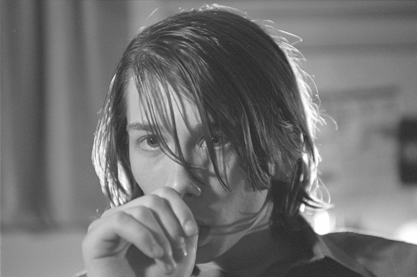Teenage thumbsucking in a world of adult children
Mental health professionals often emphasize that people often engage in behaviors that make them feel safe. Some of these things are manifestations of the mind seeking comfort or familiarity from childhood memories. But in other cases, it’s a lot more simple—merely a matter of continuing a habit from younger years that "adults are supposed to outgrow."
In the case of Justin Cobb (Lou Pucci), nothing is more comforting, more soothing than sucking his thumb. Of course, at 17 years old, this habit, harmless though it might be is a cause for great concern to his family in Mike Mills’ new movie "Thumbsucker."
The adults in Justin’s life are all hiding behind a variety of personas that mask their own unhappiness and insecurities. His parents, Mike and Audrey, insist that their two sons call them by their first names, rather than Mom and Dad, because they don’t want to admit they are responsible adults in their 40s. Mike (Vincent D’Onofrio) is barrel-like and graying but has let an injury that sidelined a potential football career overshadow his entire adult life. Audrey (Tilda Swinton) seems generally disconnected, fantasizing about a TV star Matt Schramm (Benjamin Bratt), go so far as to get a job at the celebrity rehab center where the actor winds up. She takes Justin dress shopping and asks him, "Do you think Matt would like me in this?" Little brother Joel feels the pressure "to be the normal one" in the family and wisely distances himself from everyone, in part by gay-baiting Justin—"How come you never talk to girls?"
Outside his family, Justin’s debate coach (Vince Vaughn) lives vicariously through his students. Rebecca, a potential girlfriend for Justin, initially casts him aside when he refuses to open up to her, but later manipulates him, because she can. And finally, Justin’s orthodontist Perry (Keanu Reeves) tries a new age approach on his patient, suggesting hypnosis as a way to get to some root problems, asking, "Are you ready to let go of your thumb?” But the hypnosis leaves Justin feeling screwed up, and his resulting manic state prompts his teachers to suggest he try Ritalin. The medication helps, but adds an unmistakable arrogance to Justin’s style. His relationship with his debating coach is soon undermined, and he’s quickly drawn into a maze of sex and drugs.
"Thumbsucker" excels in exposing the fragility that saddles the average family. At one point, Audrey, pale and faint, notes, "I thought having a family meant you’d never be lonely." When the Ritalin helps Justin win debates, Mike says to Audrey, "It was easier when he was always screwing up." The truth of the matter is that Mike is unable to deal with his son head-on one way or the other.
A persistent theme in the movie is that that everyone seeks company, but cannot bear the companionship when it appears. "Thumbsucker" is dominated by detachment and sadness. Happiness remains a possibility, but Mom longs for the approval of a TV cop and Dad has spent almost two decades wondering "what if? Perry seems to offer Justin the strongest bond, but when he tell him, "The trick is living without an answer… I think," it’s hard to avoid the feeling that this latest aphorism is simply yet another "answer."
Director Mike Mills does a great job of using the Oregon suburban landscape to underscore the film’s themes of alienation and yearning. Justin is often separated from others by lampposts, fences, trees, and roadways. Mills uses a music to create moods as well, and, though overdone a bit, it often it works well, with one song suggesting we "find some beautiful place to get lost."
Along with an excellent script, "Thumbsucker" has great casting. D’Onofrio and Swinton are young enough to fit the bill of parents who can’t believe they are old enough to have a teenage son. Reeves, who excels in this sort of character role, is perfect as the would-be guru, and his chemistry with Pucci suggests an older brother or mentor relationship that works quite nicely.
“Thumbsucker” is often moody and deals with fraught themes, but is far from a downer. During one of his debates, Justin questions the idea that "everybody has to be the same." Ultimately, the film makes clear that Justin has to find his own way in the world.
gaycitynews.com



































